Title
|
Summary
|
Thumbnail
|
|
|
Bangs decries the evils of conformity and extols the virtues of using one's intellect to change the world by changing one conformist at a time.
|
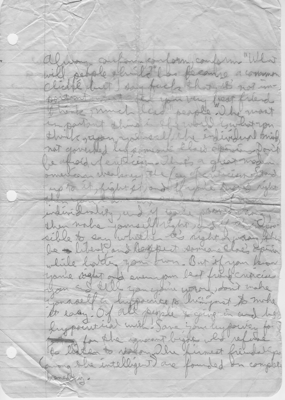
|
|
|
This series of three spontaneously written compositions includes, "Jimmy and Marsha," a dramatic dialogue; "I used to laugh....," a poem; and "Goodbye Cruel Word," brief prose.
|
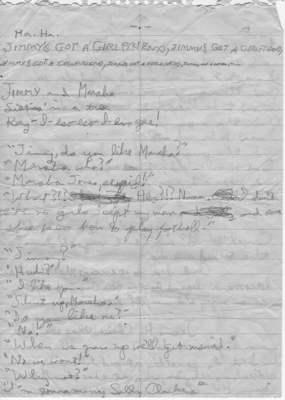
|
|
|
Bangs's write stream-of-consciousness existential musings about clouds, conformity, and transcendence.
|
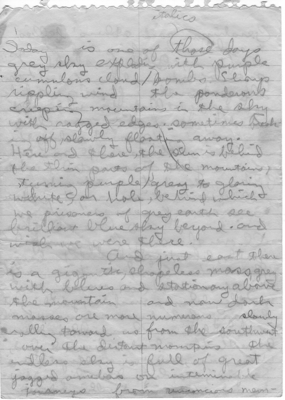
|
|
|
Bangs writes two letters: 1) on the occasion of his 14th birthday, a catalogue of the literature and music books in the school library where he is sitting; 2) a follow-up response to the first letter in which he introduces the recipients of his future letters and poems, Tamara, and recounts a visit to Aron's Records.
|
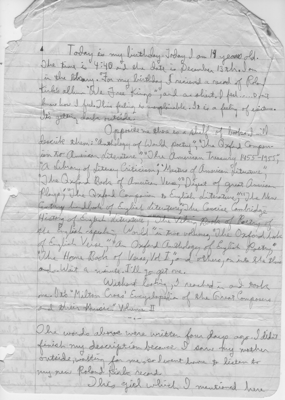
|
|
|
Lester's first letter to Tamara outlining his intentions and discussing the punctuation marks; concludes with several creative works as illustrations, including his first picture poems.
|
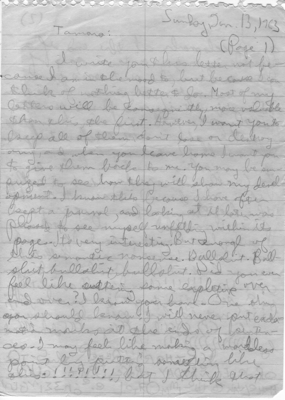
|
|
|
Creative musings and compositions addressed to Tamara, including jabberwocky poetry and prose inspired by William S. Burroughs's "Naked Lunch"; written in stages, beginning with the night of January 15 and concluding the following morning. Includes many references to artists and writers of interest.
|
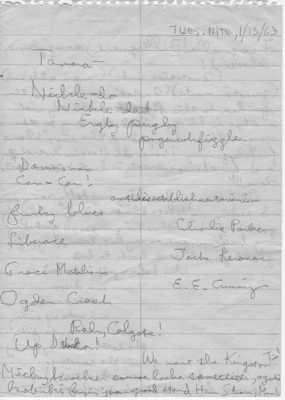
|
|
|
Written on a Wednesday morning, Bangs composes another bebop improv poem to Tamara, again with references to free jazz composers and popular culture.
|
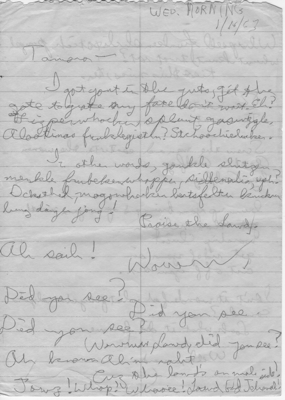
|
|
|
While listening to a Miles Davis record, Bangs composes a letter to Tamara that complains about his mother, then moves outdoors to recollect an altercation he witnessed between youths. The letter shifts into a spontaneous transcendental outpouring before its conclusion.
|
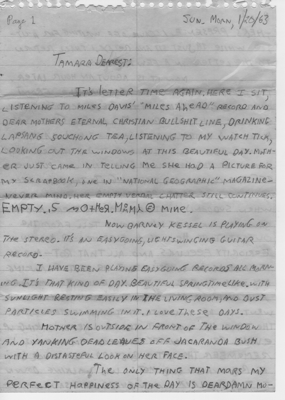
|
|
|
Over the course of two days, Lester recounts to Tamara several dreams he had involving his cousin, Ben Catching, novelist Henry Miller, and a visit to Tamara's house, a junior science kit, and Tamara's younger brother.
|
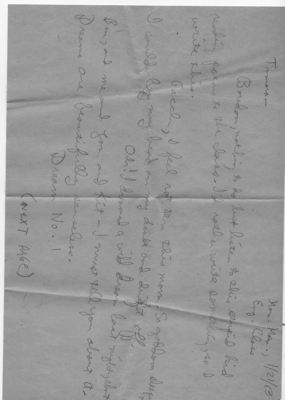
|
|
|
another letter to Tamara, this time written in a Wednesday morning English class, in response to a discussion of a Sara Teasdale poem; contains a length account of his mother destroying his poetry and artwork, his plans to run away from home, and the 2nd of five poems written to Tamara in stream-of-consciousness bebop style.
|
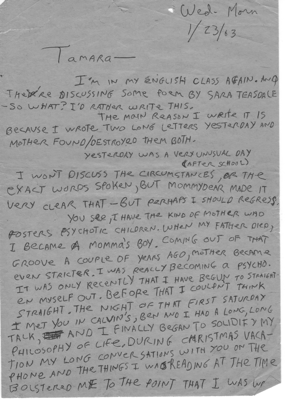
|
|
|
Lester writes to Tamara while he is at a meeting with his mother at Kingdom Hall and discusses some of the folly of his earlier writings, including his determination to give up writing, a decision inspired in part by a landscape painting he encountered in Time Magazine. He further opines about wishing to free himself of an addiction to a humdrum life and find a wisdom that lies beyond expression.
|
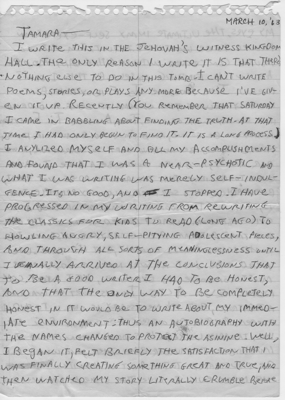
|
|
|
Lester Bangs writes to Tamara with a critical reply to an incident in which he was sarcastically chastised by her not to judge his inferiors. Lester rebuts the accusation and the underlying premise that there are such things as inferiors, with reference to the philosophies of Bertrand Russell and Buddhism.
|
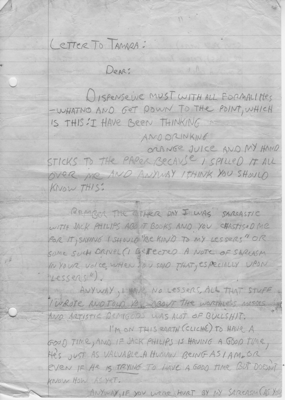
|
|
|
Begins loosely written in the style of a poem while Bangs is listening to Brazilian composer Villa-Lobos's “Little Train of the Caipira" then moves to traditional prose in which he explicates it and discusses the importance of passionate honesty, moves to the topic of hypocrisy, then ends with a reminder to Tamara to honor her promise to lend him a classical album.
|
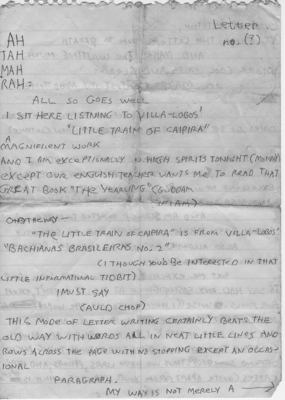
|
|
|
A typescript of Lester's passionate editorial about the falsity of American intellectuals and their devotion to "hipness," followed by an equally passionate plea to Tamara not to give up hope on the world and to continue to fight conformity; Bangs goes on to distinguish the aimless anger of youth from the virtue of idealistic rebellion, ending with a declaration of his love for Tamara.
|
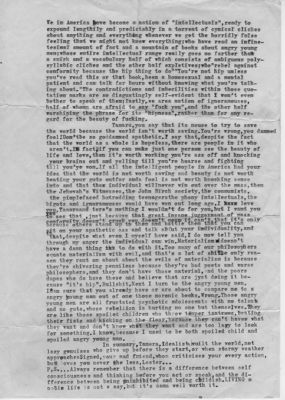
|
|
|
A long honorific poem in two parts, written in young Lester's characteristic bebop-inspired, free-jazz voice, composed in homage to primarily to Ray Charles and Milt "Bags" Jackson, but with references to other jazz artists.
|
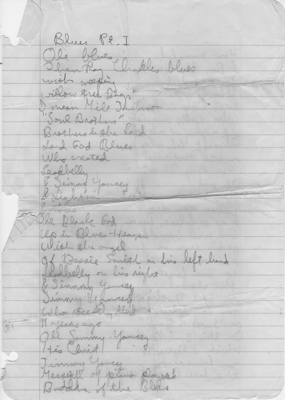
|
|
|
This Beat inspired poem is one of Lester's best-written in this collection. Despite its title, it seems more accurately about walking in El Cajon between the hours of 3 and 6 A.M., ending with an allusion to the ultimate nonconformist in American literature, Herman Melville's Bartleby, The Scrivener.
|
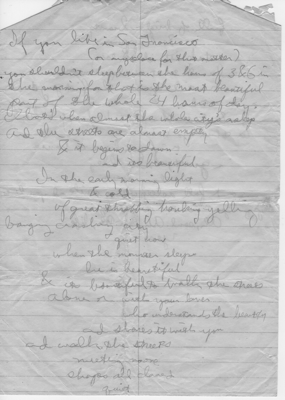
|
|
|
Possibly typed by Lester for inclusion in the school literary journal, this brief satirical poem about dairy doesn't miss a chance to allude to psychoanalysis in its closing lines.
|
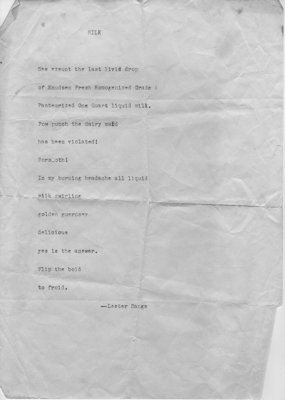
|
|
|
Acknowledged in the composition as a crossover between a letter and a poem, Lester writes to Tamara about avoiding being judgmental; contains references to his undated typewritten letter to her about "saving the world."
|
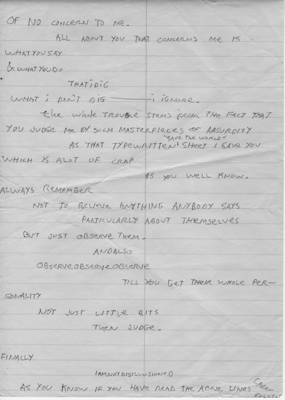
|
|
|
Written ostensibly as a love poem to Tamara, Bangs forgives her for her "unhip" materialism, then goes on to parody Sigmund Freud before discussing the nobility of soulful truth seekers.
|
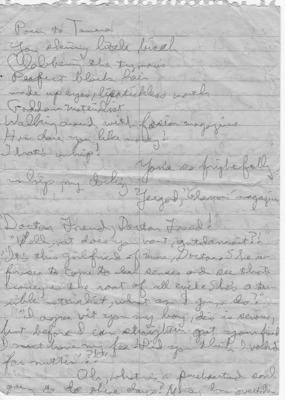
|
Poem To Tamara, #2
|
See "Letter: January 23, 1963"
|
|
|
|
Lester's vernacular poem about Tamara's nonconformist beauty also honors the voice of e.e. cummings with its break from traditional typography and punctuation. It later broadens to address preoccupation on image, with references to jazz and philosophy.
|
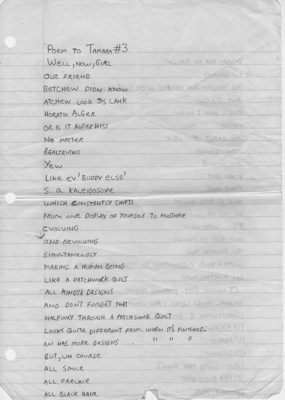
|
|
|
First, a poem with a spontaneous, free-flowing declaration of love, ending with an acknowledge of Lester's joy in "reading and listening to Spain ; then, a prose poem about Spain, beauty, and the purity of freedom.
|
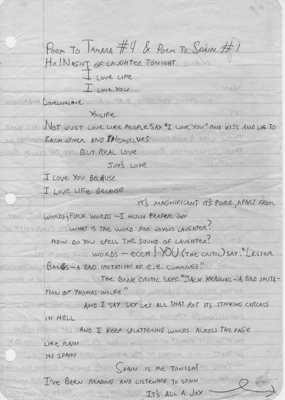
|
|
|
Titled as a poem, Lester Bangs actually intended this as a letter of apology to Tamara, and makes mention of "superiority," a topic of another apologetic letter (undated) in which Lester addresses Tamara's suggestion that he has been judgmental to his "lessers." The letter's conclusion is missing, but it takes up a more traditional prose style before its truncation, making reference once again to the Father of Psychoanalysis, Sigmund Freud.
|
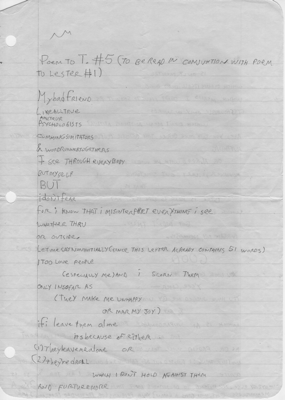
|





























